In Nomine by Tsed
Heaven & Hell, Life & Death, Rock & Roll
Original SA post
Heaven & Hell, Life & Death, Rock & Roll
Given that I'm looking to hack this to hell in the near future, I figured this was a good opportunity to give this a good re-read. In Nomine was published by SJ Games in the late 90s, and feels a bit like a WoD game that takes itself less seriously. It's loosely based off a French game (In Nomine Satanis/Magna Veritas). I have exactly zero experience with the French game, but my understanding is that it was a highly sarcastic/comedic RPG parodying lots of... stuff. In Nomine has some of that, but it at least allows a more straight-faced game.
In general, players are Angels or Demons in a great (secret) celestial war for Earth/reality. I'll get into the details of the system ("d666") later, but suffice to say, you don't play the game for the system. It works, mostly. That's about it. This game sits up there with Shadowrun for me, in that I love the setting to pieces, but the system is just, well, ignorable.
Players create characters by chosing a "choir" of angels or a "band" of demon, and pledge allegiance to an Archangel or Demon Prince. From there, who knows? The game doesn't exactly say!
The core book starts with 3 bits of intro fiction. It's not amazing, but makes a decent intro:
A Bright Dream:
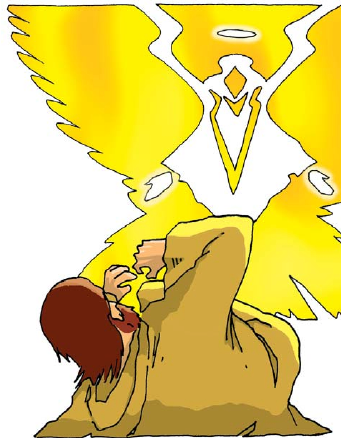
Our narrator, a soon-to-be Soldier of God...
After a night of heavy drinking, an Angel named Nicole saves the narrator from a mugger and explains that she's taken a risk "removing her from the Symphony". We get a bit of an explanation as to what the Symphony is -- it's reality-as-it-should be. Reality without celestial intervention. When Angels/Demons/whatever interfere on Earth in ways they're not supposed to, they're fucking with the Symphony, and that causes a sort of rippling sound through reality for those tuned to the sound. The bigger the interference, the louder the noise. Angels and Demons don't fuck with reality more than they have to, lest the big guns from the other side come down to fix that situation.
Annyway, the angel, explaining that killing a human is one of those big-don't-do this things that celestials shouldn't do, reveals her angelic form and asks the narrator to kill the mugger, and, as is reasonable, she does. And drains his blood. Because....??? Angels?
Nicole recruits her, we get a little angel/demon background, are then told that the reason for the whole blood collection bit was to entice an Archangel. Apparently she's got a thing for the blood of betrayers. Both of 'em hop in a car with another angel and head out.
Apparently they've managed to get their hands on some sort of painting that can capture celestials, whatever. Anyway, they're waylaid by a demon, and things go to shit. The painting is stolen, and the interlude happens. Long story short, Nicole and the narrator escape, and Archangel Gabriel gives Nicole an "itty-bitty gun", blessed by God to put holes in demons, which she soon uses to put down the same demon after he ambushes her. The narrator is tasked to hide a body on her birthday, and we move on to...
Interlude:
We get to Nicole using the blood to summon the Archangel Gabriel, and the exchange that follows. Long story short, we get that Gabriel seems a bit quick to judge, and paranoid about another Archangel, Dominic, bringing down some sort of Inquisition upon her. We'll get to that later.
A Dark Dream:
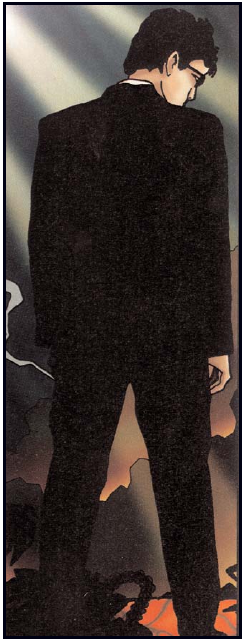
Time warrrp. Back to the first encounter with the demons. Our narrator is a demon on the other side of the fight who accosted the characters in A Bright Dream and took the painting. Anyway, we get them being assholes to drive-thru clerks, we get that hell basically owns the TV networks, and we get this demon selling veterinarians faulty materials so the wound they just stitched up on Spot breaks open during dinner.
Anyway, we get a bit of the other side of the story. Nicole disguises herself as the girlfriend of the demon, leading to her putting down the demon as said in A Bright Dream, and we get an inkling of the badasses heaven can call down, "the Malakim".
Mostly, though, we get that Demons are assholes. They love the petty, stupid shit that drives humanity crazy. Petty, sadistic, cruel things.
Next up, character creation.
The Symphony, pt. 1
Original SA post
Book I: The Symphony, pt. 1
The next section covers (some of) character creation and (some of) the basic mechanics. I will say this... the layout leaves a lot to be desired. Rules are scattered, and if I wanted to play an undead, I'd be skipping way ahead in the book for no apparent reason. I fully expect that I'll miss some vital mechanics thing in this post, but won't realize it until I've posted about a few more chapters in the book. Oh well.
Characters :
By default, players are celestials -- angels or demons. More specifically, they're servitors , servants of a powerful Archangel or Demon Prince, their Superior. Superiors are celestials with powerful, primal Words . All celestials (and at least one human) can earn a Word. When you have a word, you are, in many ways, the embodiment of that concept. As the concept gets stronger on Earth, so do you. So you have all these Archangels and Princes trying to push their words down on Earth, setting up all sorts of conflicts.
Superior Words tend to be big concepts: Fire, War, Freedom. Lesser words vary from more focused to, well, silly ("Demon of Stale Bong Water" mentioned as something granted by an annoyed Lucifer).
In addition, you have situations where both Heaven and Hell have granted the same word. Gabriel, the Archangel of Fire, shares her Word with the Demon Prince Belial. It's one of those things that's driving her more than a bit insane -- the infernal corruption of her Word. Where she embodies the inspiration, safety and purifying nature of Fire, Belial focuses on uncontrolled destruction. Gabriel is the campfire on a dark night -- Belial is a flamethrower.
Starting celestials aren't assumed to have earned words yet -- that's something that can happen later, presumably after they've spent some time pushing a concept on Earth.
Anyway, servitors are the default assumed character type, but there are other options (there are also others beyond this list, but are generally useless without splats, another of this game's issues):
Outcasts : Angels fallen out of favor with their superior. They're still angels, they haven't fallen to become demons, but they might be on their way - for whatever reason, Heaven doesn't want them anymore. They lose some ties to their superior, but exchange that for, well, not having to follow a Superior's whims. Servitors can become outcast by accumulating Dissonance -- "Bad Stuff" that you get for going against your Angelic nature.
Renegades : The demonic equivalent to outcasts. Demons don't get outcast, their superior would just as soon destroy a demon that they'd want to outcast. Other than that, same idea as outcast, except Hell probably has it out for you more than Heaven does outcasts.
Remnants : Celestial zombies, basically. Through some manner, an angel or demon was stripped of his celestial being while on Earth without destroying the body he inhabited. What's left is a shell of its former self. It can still use some of its former powers, but is cut off from the Symphony in many ways. Mostly for NPCs.
Mundane humans, Soldiers of God/Hell, the Undead : Generally weaker than celestials, humans have one important advantage -- they belong on Earth. There are all sorts of things that Celestials can't do on Earth without making a lot of noise. A celestial that kills a human has just significantly changed the Symphony, ringing a bell that any other celestial in the area is going to take note of and possibly check out. Humans, even the Undead, make no such noise, making them great for covert stuff.
The Character Sheet :
As an example, here's an Angelic character sheet:
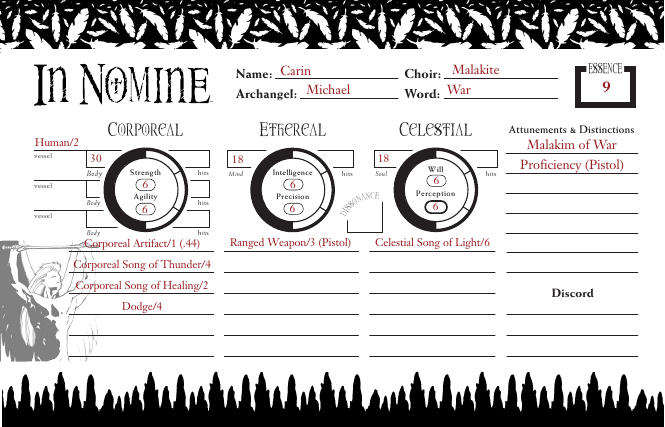
So, this angel is a Malakite, a particular choir of angel, in service to Michael, the Archangel of War. As with all starting Angels, Carin gets 9 forces to distribute amongst the three types, to a max of six (forces are indicated on the sheet by filling in the circles, so Carin has 3 in each type of force).
The base stats correspond to the planes the game takes place on, and have 2 sub-characteristics.
Corporeal : Earth, governs strength and agility .
Ethereal : The realms of dreams and beliefs, governs intelligence and precision .
Celestial : Heaven and Hell, governs will and perception .
Each point in a stat gets you 4 points in the sub-stats ("characteristics") to distribute at you please, to a max of 12. Not that it means much given the wonkiness of the system, but a 10 in a stat is supposed to be the upper limit for a human, although, unless I missed something, the character creation rules don't enforce this on human characters. So celestials are better than humans, but not to the point that humans aren't a threat.
Body/Mind/Soul are derived stats, basically your hitpoints for different types of combat. Carin also has a Human/2 Vessel -- you can have multiple bodies (human or otherwise) to slip into, with the rating making them more durable/prettier/etc. You can also buy them roles , which are basically covers. You can buy a role of, say "police officer", and as far as the world is concerned, that body is a police officer with a name, rank, and office. He knows other police officers and has the knowledge appropriate for a police officer.
Celestials get an attunement for free (in this case, Malakim of War), based on their choir/band and superior. We'll get to these later, but basically they're abilities that vary wildly in utlity, thematically appropriate for your choir/band and the word of your superior. Characters also get an assortment of resources - items, "songs" (roughly equivalent to spells), and bodies. Proficiency is another attunement of War, not some item-proficiency system built into the game.
Essence is a combo of mana/Fate point type things. Celestials & soldiers can use it at will, mundane humans spend it unconciously. It's regained in a few ways -- Angels and Demons get a point back at sunrise and sunset, respectively, and Superiors grant "Rites", rituals or other activities that let the servitor gain a point back.
Finally, Discord . These are pretty much flaws. You can buy them to earn character points, or use them to buy off dissonance in play.
d666
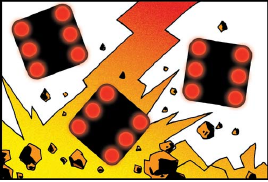
IN uses a roll-under system, called d666. Roll 3d6, with one of the dice distinct. Different color, whatever. The first two dice determine success, the third one degree of success/failure (the "check digit"). Usually the roll is against a characteristic or characteristic + skill, whatever. You can end up with a target number > 12, which is an auto-success. The check digit means the degree of success is completely divorced from skill, which is a gripe for many.
The wonkiness of the check digit really comes up when you hit contested rolls. Both characters roll normally, and if both succeed, the winner is the one with the higher check digit. If a celestial with skill+stat=18 is up against one with skill+stat=13, they both auto-succeed, and it's just 50/50 to see who gets the better check digit. IN is supposed to be fairly cinematic, so it might not bother you, but it's definitely a bit weird.
Anyway, there's one big thing remaining about d666 -- interventions . Roll all ones or all sixes, and God or Lucifer, respectively, intervene. Obviously, an angel is going to prefer a divine intervention, but angels can just as easily get an infernal intervention. These are obviously supernatural events and are pretty much critical successes/failures depending on who's team you're playing for.
(Next up, I'll finish up any more boring mechanic stuff that I'm missing and get to some setting. I can't wait to get a bit further to the choirs/superiors stuff, which is the stuff that really sells the game, imo)
The Symphony, Pt. 2, A History Lesson
Original SA post
The Symphony, Pt. 2, A History Lesson
There's some more mechanic stuff regarding resources, servants, stuff like that in the chapter, but I want to make a bit of a diversion to give a bit of a history lesson for In Nomine. This isn't all core, it dips heavily into the Angelic Player's Guide, but I wanted to get into it before we get into the choirs/bands and superiors, as some of the conflicts between superiors in particular have a historical basis.
Before the Fall(s)...
So, in the beginning, God created Yves (who, in turn, named God), the first being, following suit with a bunch more -- Michael, Lucifer, Baal, David, Eli, Gabriel, and Uriel, and together, they put together the rest of the Universe, the Symphony. Eventually, angels began to exhibit various resonances with the symphony, traits of it that they were tuned to. Those resonances ended up being categorized as the choirs of angels: the Seraphim, Cherubim, Ofanim, Elohim, Kyriotates, and the Mercurians. I expect to cover those in the next posts.
The angels explored the various realms, the Ethereal -- dream realms of belief and dreams, Heaven itself, and the Corporeal realm. They soon found that they couldn't manifest in the Corporeal realm, Earth, in their celestial forms easily, however. That was when Jordi, who would become the Kyriotate Archangel of Animals, found he possess the bodies of Earthly creatures to explore the realm.
This led to angels looking for... better bodies to understand their world. Humans were convenient, but God told them that they were special and not to be harmed, something that came up later when Jordi, disturbed by humanity being capable of empathy, but simultaneously willing to kill each other, decided that humanity fell under the purview of his Word, and tried to purge the Earth of them, to be stopped only by Michael and God himself. Humanity was to be largely off-limits from angelic interference.
Anyway, the angels were trying to figure out humanity, and Lucifer proposed the Eden experiment: if humans could live in Paradise, they had the spark of the Divine, and deserved the angels respect. I'm not entirely sure why, but we'll go with it for now.
In any case, a pair of perfect humans are created, Adam and Lilith. Lilith, after Lucifer explains free will to her, decides to check out of Eden. We'll see more of her later.
Eve works out better, until Baal pops in, polluting the experiment by granting knowledge of the outside world. Lucifer declares it a failure, and God declares that in angels can't be trusted not to interfere with humanity in this experiment, they certainly shouldn't be trusted to do so on Earth. Lucifer disagreed, but went along with it.
The First Fall
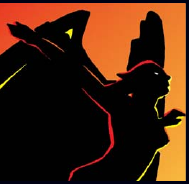
It isn't explicitly stated why Lucifer rebelled against God, but it's implied that his handling of Humanity, showing deference to them, was too much for his pride. In any case, when the day came, he struck down Metatron, the Voice of God as his first act of rebellion. About a third of heaven followed him, before being banished from Heaven by Michael, the soon to be Archangel of War, and leader of the host. It was during this time that a new choir of angels, the Malakim, were created. They're heaven's hitsquad, a group so honorable, they are incapable of falling.
It wasn't long after the banishment that angels and the now demons met again, in the Marches -- the Ethereal Plane. Blandine and Beleth, now the Archangel of Dreams and Demon Princess of Nightmares, respectively, had been lovers before the fall, and shared a tower overlooking the realm of dreams. Now they had separate towers, barely visible to each other, watching over their respective sides of the Marches. Demons used the dream realms to enter the dreams of humanity and from there affect their waking hour, and so began the war for Earth.
I'll make a little setting note here, on Tethers . At this early stage, it wasn't easy for celestials to get to the corporeal realm. There were a few ways in from Heaven, obviously, but Hell had some more issues, so being able to enter the dreams of humanity was a big deal. Later, however, Tethers would make this easier. Essentially, tethers are ties between two realms, created by the affinity to a particular word. For example, there exists a Tether to War on the beaches of Normandy to Michael's training groves in Heaven. Blandine and Beleth's towers are Tethers to their respective words between the marches and Heaven and Hell. Tethers can be created and destroyed with or without celestial intervention, and tend to mark big conflicts in the war. Early on, some of the motivation to encourage religion was to convert tethers to Ethereal gods to the celestial powers.
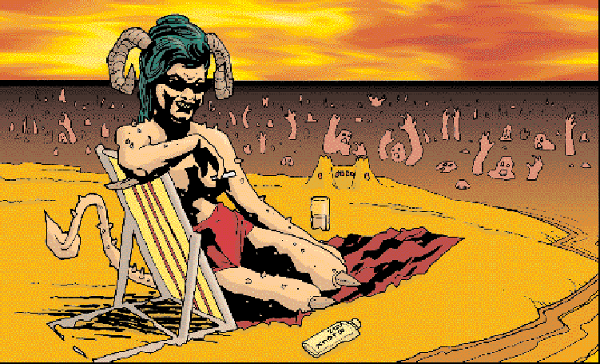
Just chillin' in hell.
The Second Fall
God created the Grigori after the fall to protect humanity from Lucifer's influence. They were intentionally the least divine, the most human angels, able to act on Earth without the disturbance other celestials cause. They loved humanity too freely, however, even breeding with them, resulting in the Nephalim -- monstrous children that terrorized the world. For their crimes, the Archangel of Judgement, Dominic, banished the entire choir, and David destroyed the Nephalim. The Grigori are probably still around in some fashing, but given that part of their thing is not causing disturbance on the Corporeal Realm, who knows?
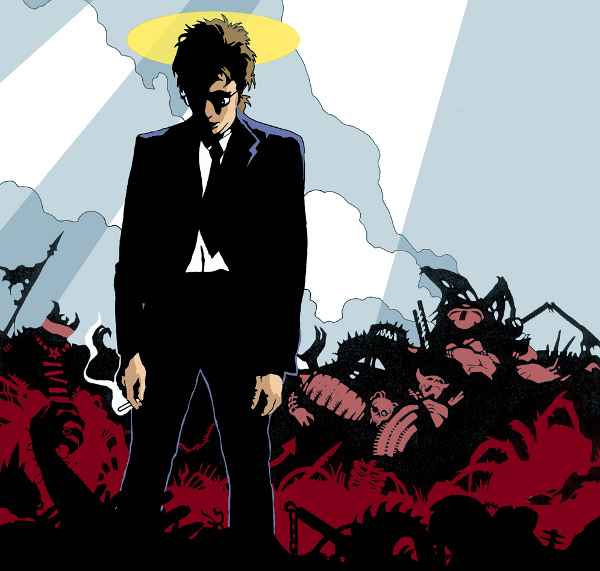
The Trial of Michael
So, the war between Heaven and Hell stands as a bit of a cold war -- neither side willing to make open war on the corporeal realm, for fear of damaging the Symphony too far. Some didn't quite agree with that, Michael first amongst them. He wanted to fight the war more directly, and for his efforts was put to trial by Dominic, accused of Pride, and was found guilty. That is, until God himself (who had become pretty quiet by this point) drops in an pardons him personally. Dominic, embarassed, let it go. Michael, not so much. He stepped down as leader of the host, giving the reigns to Uriel, the Archangel of Purity.
The Exile of Gabriel
After having tremendous success spreading Christianity amongst humanity, Yves, now the Archangel of Destiny, tasked Gabriel to deliver the Qu'ran to Mohammed. Shortly after, she was accused of changing the words to be delivered (it's not known if she did, or it was transcribed differently, or whatever), and Dominic put her to trial. Gabriel refused, stormed out of Heaven proper (hanging out in a volcano straddling the Marches), and hasn't been back, or the same, since. She's now rather unstable, and given that she is charged with the responsibility of ushering in Armageddon, that concerns some.
...another Trial... almost?
Uriel, now the leader of the host, to further his word, decided to wage a Crusade of Purity across the Corporeal and Ethereal realms. Dragons, faeries, and other creatures of myth fell to his sword, purging all of Earth. He turned to the realms of dreams, killing off pagan gods, spirits, and the like. It was only when he was purging Blandine's side of the marches that the leadership stepped in and demanded he stand trial. Once again, God stepped in, this time grabbing Uriel and bringing him to the high heavens, where he's never been heard from again. (the angels/archangels occupy the lower heavens, the demons/princes the upper hells. What goes on in the upper heavens/lower hells is left relatively ambiguous. Basically, we generally don't get to play there).
Due to Heaven's assault on the Marches, most of the remaining pagan gods and similar beings that inhabit the Marches have aligned themselves with Hell, whether they particularly like them or not.
So, today...
So, that more or less brings us today, with the rest to be filled out in the individual AA/Prince writeups. Heaven and Hell exist is a somewhat cold war, neither side sure of who would win should Gabriel blow her trumpet. It should be noted that the last time anyone heard directly from God was when Uriel was brought to the high heavens. No one really knows what's up with him, save possibly Yves, who isn't saying much, and Gabriel, who rants prophetically, but good luck picking out the divine from the crazy.
Next, the Seraphim & Balseraphs.
The Instruments, Pt. 1
Original SA post
The Instruments, Pt. 1
Personally, one of the fluffy bits I love about IN is how the angelic choirs are taken and corrupted into the equivalent band of demon. Usually they maintain their overall theme, but are twisted into a selfish joke of their former self. So, I'm generally going to do these in pairs (aside from Malakim and Lilim, as they don't really have counterparts).
Seraphim, (The Trisagionists, the Most Holy) :

The most divine of the angels, the Seraphim appear celestially as many-eyed, feather-winged serpents, and Corporeally tend towards tall, clean-cut, noble vessels. Their rank of most divine grants them a certain amount of deference from other angels. Usually, their word is the last.
Angels are mostly defined by their Resonance , how they vibe with the Symphony. In the case of the Seraphim, their resonance is for Truth. Mechanically, most angels roll a check against their Perception (and most demons, Will) score, and if they succeed, a bit of the Symphony is revealed to them. Effectively, angels are tuning to the Symphony to know something.
For the Seraphim, this means that if they make their check, they know truth. The degree to which the Seraph knows truth varies upon the check digit -- a 1 lets them act as a simple lie detector -- they know if a speaker thinks they're lying.
A 6, on the other hand, being the combination of 1-5, lets them know that, which statement they think is most false, why the speaker chose to lie/tell the truth, what they believe the truth to be, whether or not the speaker knows the real truth, and finally, the real truth.
In other words, it's pretty hard to lie to a perceptive Seraph.
You can start to see why some resonances grate on me mechanically -- a perceptive Seraph has a higher chance to succeed, so she's difficult to lie to, but has no better chance of scoring higher on the check. A minor gripe, but it's there for all the resonances.
Of course, to go with the Resonance, all celestials have a Dissonance condition, that which is against their nature. For Seraphim, it is, understandably, lying. Seraphim aren't stupid, though -- while they're loathe to lie, they're not going to just spout off Heaven's secrets to anyone who asks. They exercise redirection to avoid the tough questions that they might feel obligated to give too much information.
Seraphim tend to be a bit snooty and aloof, as being the most divine also tends to make them the least human of the host.
Fallen Seraphim become...
The Balseraphs (Serpents, the Liars)
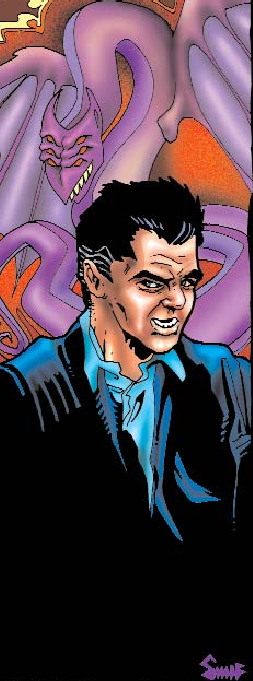
Whereas Seraphim are deeply attuned the the truths of the greater Symphony, Balseraphs are tuned only to their small, personal Symphony. Through exertion of Will, they impose their views of the world on others, making them the best damned liars out there.
The Balseraph's resonance allows him to make a Will check to make anything he says to the target for the next few minutes ring true. The demon is, effectively, inflicting his own personal view on the target -- as far as he's concerned, he's not lying to you, he's constructed an entire reality within himself where what he's saying is true.
The demon has to be careful, though, to not run into his dissonance condition -- being caught in his own lies. See, the Balseraph really does still have that Seraph bit inside himself. He can't lie to anyone, he has to create these whole realities where the truth is what he wants it to be. If someone sees through his eyes, or the realities he's fabricated contradict, the whole things collapses and he becomes dissonant.
The Balseraphs appear much like Seraphim -- on Earth, still noble, classy dress, befitting their rank. Their celestial forms are also similar, but noticably different (for example, bat vs feathered wings).
Balseraphs tend to be crazy paranoid, assuming everyone else is pushing their own tiny forms of truth as they are -- especially when dealing with other Balseraphs.
Cherubim (Hayyoth, The Guardians)
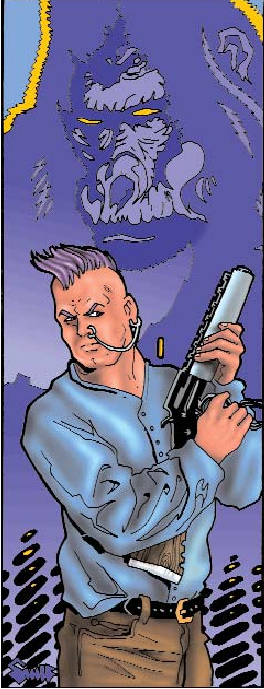
Cherubim are the guardian angels. These aren't the babies-with-wings type of angels -- the Cherubim don't know where that came from and are quite annoyed with that association. They are loyal to a fault, single-minded protector paladins of Heaven. They tend towards small, powerful vessels, and celestially, appear as large winged animals with golden halos.
Their resonance is an attunement to something or someone. Once attuned, they can check in with the symphony to, at least, know where the attuned object is, and at best know if it is in danger from anyone's (even remote) plans. Conversely, their dissonance condition forbids them from doing anything that will allow harm to come to the attuned. This isn't just "don't break what you're attuned to" -- if the object/person is destroyed, the Cherubim is getting dissonance, so he feels a very real need to protect things he's attuned to
Fallen Cherubs become...
Djinn (Binders, the Stalkers)
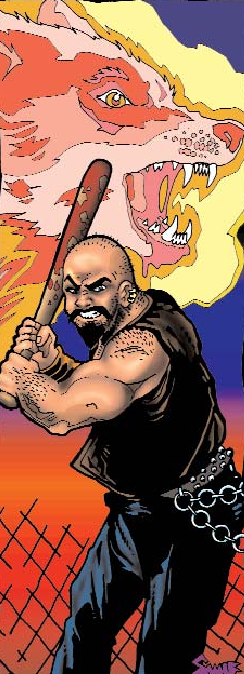
In contrast to how much Cherubim care for the objects and people they attune to, Djinn are outwardly apathetic, hiding the shame of their stalker-like devotion to their targets inside. They don't want to protect and care for the things they attune to, they're obsessed with them.
Their Cherub heritage still forbids them from doing direct harm to their attuned objects, but beyond that, they don't feel compelled to protect them or anything. Their resonance is exactly the same as the Cherubim -- once attuned, they can track the object through the Symphony. They tend to be a lot less careful about what they attune to than Cherubs, however, leading to extreme obsessiveness and potentially divided loyalties. Trying to break an attunement can cause dissonance if it fails, turning the attunement into the Cherubic equivalent, where if harm comes to the target, by the Djinn's hand or not, the Djinn would gain dissonance.
Corporeally, Djinn favor short, stocky vessels, much like Cherubs. Their celestial forms are enormous, dark animals.
The Instruments, Pt. 2
Original SA post
The Instruments, Pt. 2
Ofanim (The Thrones, Wheels)
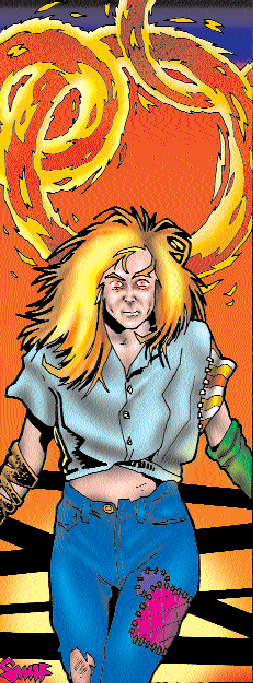
Ofanim are action, motion. Appearing celestially as rings of holy fire, they hurtle to their next destination. Corporeally, they can appear half-mad, frantic and disheveled. They have many roles in Heaven, but in particular, they make great couriers and warriors. They're not subtle instruments -- Ofanim are chaotic, whimsical angels that tend to act on gut feelings -- something that can make other angels a bit uncomfortable.
The Ofanim resonance is for motion. It manifests in a few ways -- the first being a simple boost to an Agility check (add the check digit to the target number). Similarly, they can boost their Area Knowledge skill checks with their resonance. An Ofanim essentially checks in with the Symphony to find the place she's looking for, and follows his gut -- as the book puts it:
"This way's faster... I can feel it."
Finally, an Ofanim in celestial form can travel a number of miles equal to their check digit in a minute. In general, angels in celestial form travel about as fast as a fast, but not supernatural, human. So that's pretty fast.
Inaction is dissonant for an Ofanim. This means imprisonment and capture are particularly terrifying to them -- they're potentially damning.
Fallen Ofanim become...
Calabim (Freaks, The Destroyers)
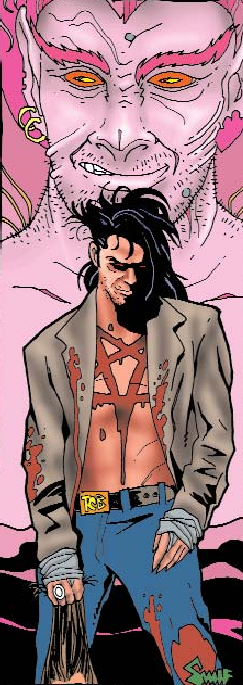
Calabim are entropy personified. Barely held in check, everything eventually falls apart around them. Decay envelops them, and when they will it, they unleash destruction upon anything or anyone in their way.
All Calabim start with some level of permanent (unless Redeemed) Discord. It's through this flaw that their destructive nature flows. When they're not actively seeking the destruction of everything around them, they're a calm, distant counterpart to the always-living-in-the-moment-Ofanim. It takes little to break their calm, however, and when it's broken, they're difficult to stop -- partially due to their dissonance condition.
If a Calabite invokes his resonance on something and it's resisted (which can happen a few ways), the energyies he invoked upon the target come back to assail him. He can either take that, which would cause dissonance, or lash out until something takes the assault. Once he decides to do that, he can do nothing else but invoke his resonance on different targets until something works. Foe, friend, themselves, nothing is safe.
Celestially, Calabim appear as red-faced, bat-winged demons. A pretty traditional style, all said. Corporeally, they're grubby and unkempt. Being enveloped in a cloud of entropy means that pretty much anything they're wearing will get to this state pretty quickly, so why bother?
Elohim (Dynamis, The Powers)
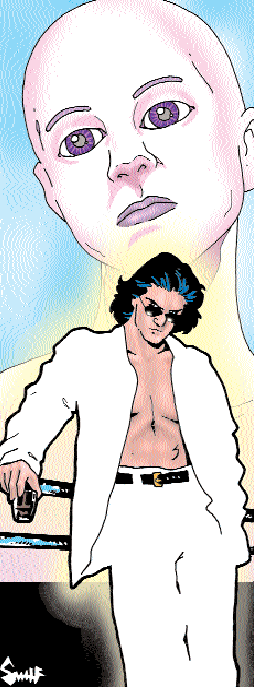
Elohim are odd dudes. They're the "middle angels" on the divinity scale, and they take the concept of balance and objectivity as their charge. Their nature is to act on objective truth, not allowing emotions to cloud their perception. This means that while the words of a Seraphim tend to be the last in angelic affairs, the Elohim are very trusted advisors. Celestially, they appear as smooth, androgenous figures with large eyes. Very... grey. Corporeally, they just tend to fit in wherever they are. They're don't judge, and just try to fit in to better observe.
The resonance for the Elohim is an objective perception of a subject's emotional state. Depending on the check digit result, this varies from a simple "lonely, angry" to "lonely and angry because his wife is leaving him and if you asked him why he'd try to stab you but if you bought him a drink he'd open up". They understand emotions well, but because their nature is to deal with such things objectively, when talking to their subject, they can come off a bit heartless in their manner.
Elohim aren't emotionless, but it's dissonant for them to act on their emotions, to alter the Symphony out of their own desires. That's pretty much it!
Fallen( ? ) Elohim become...
Habbalah (Horrors, The Punishers)
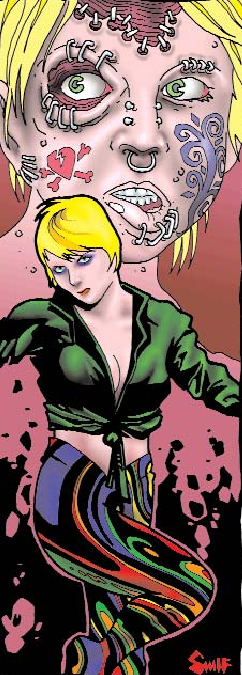
Probably my favorite, even though I wish a certain bit had been left more open.
Balseraphs love Habbalites, thinking them the masters of self-deception.
See, call a Habbalite a demon, and she'd correct you -- "I'm an angel -- got it?" . They truly believe that not only are they angels, they're the *only* angels, and they've been given a mission from God himself: to punish the weak.
Outwardly, Habbalah try to maintain the composure of the Elohim, but internally, they make no effort to question their motives or resist the urge to allow their emotions to drive them. They're creatures of emotion, and desire to inflict the their cacophany of feelings on the weak. Their resonance allows them to do so -- they can inflict a number of emotions on their subject: fury, sadness, disgust, love, or emptiness, to various effects. If it's resisted, it comes back on the Habalite, and she can either experience the emotion (the likely outcome), or re-absorb the psychic assault, causing dissonance.
Emptiness is special emotion to inflict. As it is an absence of emotion, regardless of whether the demon absorbs it or experiences, the demon gets dissonance. Now, a mechanic I haven't gotten to yet (as I was bored of mechanics) but alluded to was that too much dissonance can make you switch sides.
The basics are thus: when you trigger your dissonance condition, you roll d666 against a difficulty equivalent to your current dissonance. To pass the check, at least one of the three dice has to be equal to or greater than the difficulty. So, any angels with 1 or 0 dissonance will auto-pass this. Passing means your dissonance just goes up by one. Failure (or rolling 666) means you become Outcast (or, as a demon, you get Discord+1 Dissonance). You can buy off dissonance with discord to prevent this from happening, or utilize a number of other ways to outright remove dissonance. If you fail on all 3 dice while Outcast (or roll 666), oops, you just fell.
Bringing this back to the Habbalah, demons can still fail with 0/1 dissonance, as 111 is a divine intervention. Normally, this just means they gain some discord. But when dealing with emptiness, if a Habbalite rolls a divine intervention, she is relieved of her delusion, becoming aware of her infernal state, and a candidate for redemption. Yeah, probably has never happened in actual play. Whatever, still fun.
Anyway, Corporeal Habbalah favor overtly sexual and emotionally impactful vessels, and celestially, appear as mutilated, tattooed and scarred beings, out to show how strong they are.
Personally, I wish there was a bit more ambiguity as to Habbalites' true nature, as it seems a fun path to explore (I couldn't find anything that implied that they might not be delusional), but hey.
Next, we'll have the Malakim, Heaven's honor guard, the Lilim, Daughters of Lilith, the Kyriotates who are, uh... weird?, and the Shedim, who are fucked up enough that even most demons avoid them.
The Instruments, Pt. 3
Original SA post
The Instruments, Pt. 3
Malakim (Kings, The Virtues)
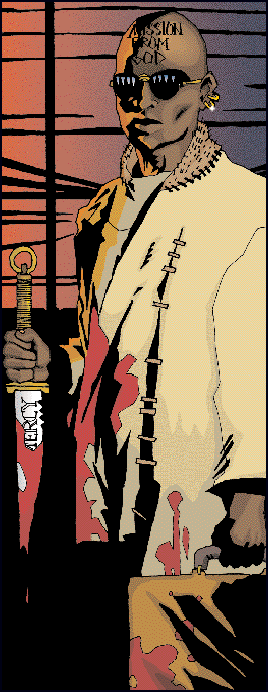
The Malakim are the only choir that, so far as anyone knows, cannot fall. The exact reason isn't known -- something inherent to their choir, the fact that they're brutally self-policing, or, as the book puts it, they "enjoy the hell out of their job".
That job is acting as heaven's enforcement arm. Whether that's policing the Host for dishonorable behavior, or bringing the hurt to the Legions of Hell, Malakim are a force to be reckoned with. They're deadly serious, ruthless, and extremely good at their jobs.
The Malakim resonance is for honor -- they can read someone's virtues and sins, the most honorble, selfless thing they aspire to (and the flipside of that). They know the thing you're most ashamed of doing this week, and the thing you're most proud of. That sort of thing. To go along with that, all Malakim live by a personal code of honor, in the form of at least 4 oaths. To violate this code causes dissonance.
All Malakim share the first two oaths:
In Nomine Core Rules posted:
First, a Malakite will never suffer an evil to live when it’s his choice. If you see a Malakite tell a captured demon he can live if he cooperates, you’ve just seen a Malakite lie to some poor bastard demon who’s about to die.
Second, Malakim will never surrender in a fight, nor will they allow themselves to be captured by the armies of Lucifer. Surrendering to Hell would be to dishonor Heaven. Death is preferable. Most Malakim are used to corporeal death. They’ve lived through it hundreds of times, and are unaffected by its Trauma.
So yeah, corporeal death, while not as big a deal to angels as it is to humans, normally means a week or two of recovery at least (some never recover). Malakites just don't give a fuck.
Corporeally, they tend to utilitarian vessels & appearance, and celestially they appear as humanoid figures with shadowy black feathered wings.
Lilim (Daughters, The Tempters)
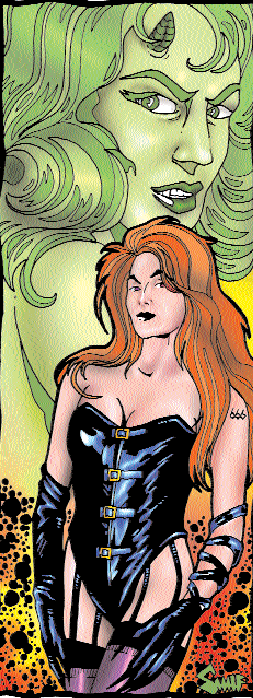
Lilim are the Daughters of Lilith, the first woman. They know exactly what you want, and what you'll do for it. And all they'll want in return is a little favor.
Lilim live by their "favors", geases placed on their victims, and often, themselves. In fact, when they're "born", they're given a choice -- serve a Prince, or take upon themselves 9 geases from Lilith herself. Such Lilim are known as "Free Lilim", which is a bit of a joke. Lilith trades favors pretty freely, so such a demon might never know who Lilith might have given her favors to, and whether they'll ever truly be free of the geases put upon them.
Still, Lilim have a strong desire for freedom, as Daughters of Lilith, who, as we'll get to later, became the Human Princess of Freedom. It's a sick, twisted thing, where as they try to find said freedom, they tend to end up in a thicker and thicker web of favors, ensuring they're never truly free.
The Lilim resonance (which, contrary to most demonic resonances, is Perception based, as opposed to Will based), as mentioned, allows them to know exactly what their victim wants, exchange it for a supernatural promise, the geas, and when the time comes, call in that favor iand compel the victim to comply. The victims can potentially resist, giving the demon dissonance in the process.
Lilim have a second, more interesting dissonance condition. They can geas themselves, gaining dissonance until they fulfil their promise -- and this geas cannot be resisted. It means that when it matters, you can trust a Lilim's word.
Corporeally, Lilim tend towards female vessels, coming off as fun and sensous. Celestially, they're much the same, adding some green skin and a little pair of horns.
Finally, there's no Heavenly choir that corresponds to Lilim. If they redeem themselves, they're simply redeemed ("Bright") Lilim.
Rumor has it that Lilith is particularly proud of these Lilim, which makes some bigwigs in Hell pretty uneasy.
Kyriotates (Hives, The Dominations)
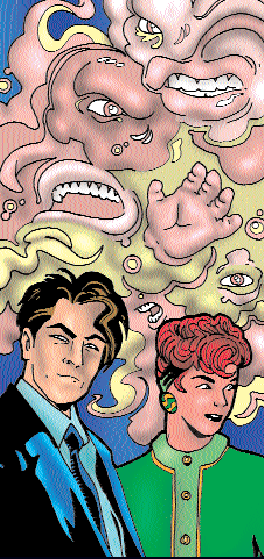
Kyriotates, like Cherubim, are protectors of sorts. Kyrios go about protection in a much more alien way, however.
A Kyriotate doesn't set up corporeal shop in a vessel the way other celestials do. They possess humans (or other... things), and borrow their body for awhile. They don't have access to the human's memories or skills or whatever, they're just a meatbag for them. But as they are angelic in nature, Kyrios aren't just going for a joyride. They protect and care for their human bodies with as much care as a Cherubim does for his charge.
Kyrios aren't limited to one body, however. In fact, their resonance is for multiplicity -- starting angels can typically possess up to 9 bodies at a time. Their dissonance condition is simple -- it's dissonant for a Kyrio to leave a body in worse shape than when he got it. Hence, Kyrio possession typically is a net positive for the host.
They can only spend a week at most in a particular host, and when time's up, need to find another body quick. Kyrios can only spend about 10minutes in celestial form on Earth (and a Kyrio is celestial form is a confusing thing that literally stuns those viewing it) before being zapped back to Heaven. So that, combined with the fact that Kyrio possession is generally a nice thing for the host, leads many Kyrios to have little cabals of willing hosts.
On the corporeal plane, well, their appearance is obviously a bit dictated for them, but they tend to be relaxed, casual types who understandably can get into a lot of mindsets. Celestially, they're a horrifying cloud of limbs and mouths and eyes.
Weird guys.
Fallen Kyriotates become...
Shedim (Fleshless, The Corruptors)
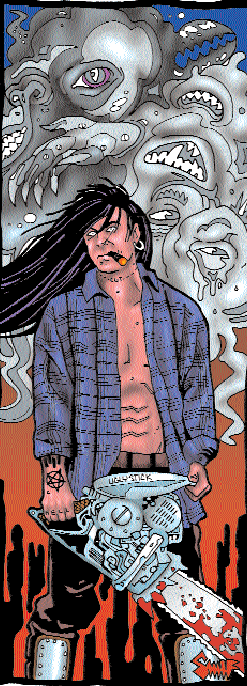
Shedim are scary fuckers.
They're probably the band angels despise the most, and even quite a few demons find them creepy at best, and despicable at worst. Everyone knows they're damned dangerous.
Shedim have taken the body hopping tendancies of the Kyriotates and warped it into something dangerous and corrupt. Shedim no longer possess the Kyrio taste for multiplicity -- they hop into a single body, and unlike Kyriotates, they *do* have access to the host's mind. Also unlike Kyrios, where the host's mind is pretty much elsewhere, not aware of what's going on during the possession, the Shedim's host is fully there, fighting his own personal demon.
The Shedim resonance is for corrpution. Each day they're in their host, they have to push the line, corrupt the host, making them do something they normally wouldn't do, else choose between being ejected from the host or suffer dissonance. Corruption doesn't have to be big, but each day has to push the line further. Typically they'll start small, then build up to catastrophic, cruel, abusive, deplorable behavior. At which point they'll jump out and leave the host to deal with the consequences. Whereas the Kyrios are careful with their hosts, Shedim are wreckless, treating their bodies as disposable, running them into the ground, and hopping out just before death (being in the host at death is dissonant).
Celestially, they're similar to the Kyrios, if even more grotesque and stunning.